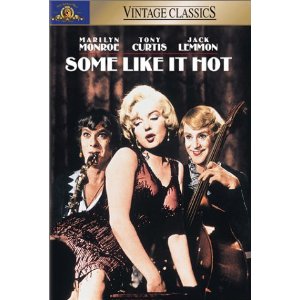 By Jae-Ha Kim
By Jae-Ha Kim
Chicago Sun-Times
January 30, 2003
Long before “La Cage Aux Folles,” “Tootsie” and the much-maligned “Bosom Buddies,” Tony Curtis and Jack Lemmon were making like women in “Some Like It Hot.”
Curtis returns to the gender-bending format in the musical version of “Some Like It Hot,” which opened Tuesday night at the Rosemont Theatre. This time around, instead of playing one of the randy young men posing as a woman, he portrays a randy old man who falls in love with one of the women who really is a man.
Based on Billy Wilder’s 1959 classic film, this production is a reworking of the 1972 musical “Sugar” by Jule Styne and Bob Merrill, with a book by Peter Stone. Set in 1929, “Some Like It Hot” centers on two out-of-work musicians, Joe and Jerry, who witness the St. Valentine’s Day Massacre in Chicago. Hoping to save their lives, they disguise themselves as Josephine and Daphne to tour with an all-female band booked to play at a Miami hotel. They are, as one of them astutely points out, big, ugly girls.
Unfortunately, it takes a while to differentiate one from the other. In the film, Curtis (who played Joe/Josephine) and Lemmon (Jerry/Daphne) had distinct looks and sported different color wigs. The same can’t be said for Arthur Hanket and Timothy Gulan in the current production. With their similar builds, blond wigs and vocal intonations, Hanket’s Josephine and Gulan’s Daphne are difficult to tell apart.
Both are immediately attracted to the band’s star, a comely blond named Sugar Kane, who keeps a flask close to her chest and longs for a sweet, four-eyed millionaire with a yacht. While Jerry is upfront with Joe about his attraction for her, Joe dupes his friend and implements his own plan to win over Sugar. Joe then invents another personality and literally becomes the Joe Millionaire of his time.
Curtis appears about halfway into the production and easily handles the role of Osgood Fielding III, a millionaire who falls for Daphne. It would’ve been an ironic twist of cinematic history if Curtis had gone head over orthopedic heels for his own onscreen self instead of the Lemmon character, but that’s not meant to be.
As for his musical ability, the screen legend is a trooper but not a particularly gifted vocal talent. He doesn’t sing as much as he talks this way through the songs, sounding kind of like William Shatner by way of the Cowardly Lion. The songs by Styne and Merrill get better treatment by the lesser-known cast members, but let’s face it, none of the musical’s bland songs are memorable, no matter how talented the singer.
Curtis is the big draw, but “F Troop” fans will be delighted to see an almost unrecognizable Larry Storch as the wimpy band manager Bienstock.
Sweet-voiced Jodi Carmeli, who plays Sugar, is the spitting image of Marilyn Monroe (who of course played the role in the film). Projecting sensuality as much as she does vulnerability, Carmeli toes that delicate line adeptly.
Then there’s the 6-foot-5-inch William Ryall, one of the most unusual and impressive tap dancers to behold. As head thug Spats, the impetus behind the Valentine’s Day Massacre, he leads his posse in a gangsta tap where the machineguns’ tat-a-tat-tat are sounded out by their tap shoes.
As for the play’s ending, it comes from a sweeter time when women forgave men for dressing up as women who dressed up as other men. If this production were set in today’s world, everyone would probably end up on Jerry Springer’s show.